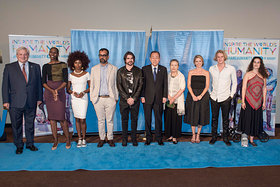United Nations Secretary-General Ban Ki-moon kicked off World Humanitarian Day with a reminder that “each one of us can make a difference” and " help create a more humane world."

Credit/Copyright: UN Photo/Cia Pak
“On this World Humanitarian Day, I urge everyone to show solidarity as global citizens by signing up to the #ShareHumanity campaign,” said UN Secretary-General Ban Ki-moon at a special event at UN Headquarters in New York on the eve of World Humanitarian Day 2015, marked annually on 19 August.
“Help us to share moving stories of hope and resilience from around the world. Help us to inspire new heights of humanitarian awareness and action.”
The campaign, launched last week, leverages the collective power of individuals to inspire a greater sense of global citizenship using the power of social media. Users are asked to turn their social media feeds into storytelling platforms to spread awareness of humanitarian crises in countries like Syria and Afghanistan.
At the event, humanitarian leaders, media and celebrities joined together to generate a critical mass of support for #ShareHumanity campaign, Australian singer-songwriter Cody Simpson, Malian-French singer-songwriter Inna Modja, and Colombian music superstar, Juanes, inspired the audience with their performances.
“Tonight is also a celebration of the values and principles that drive our actions: the humanitarian instinct to support people in need,” said the UN Under-Secretary-General for Humanitarian Affairs, Stephen O’Brien.
The UN Secretary-General also paid tribute to the 120 humanitarian aid workers who lost their lives in 2014 in the service of helping others. World Humanitarian Day also marks the day in 2003 when 22 UN workers were killed in a bombing of the UN offices in Baghdad. A wreath-laying was set to be held in New York. “Each year, on World Humanitarian Day, we honour the selfless dedication and sacrifice of those who devote themselves – often at great personal risk – to assisting the world’s most vulnerable people,” he said.
According to the UN Office for the Coordination of Humanitarian Affairs (OCHA), today, more than 100 million people in countries across the world need urgent life-saving humanitarian aid, with nearly 60 million people now forcibly displaced. This is a crisis of forced migration on a scale not seen in the post-World War era, in which a displaced person will remain, on average, displaced for 17 years.
These growing humanitarian needs and finding better ways to respond to them are the impetus behind the Secretary-General’s World Humanitarian Summit, to be held in Turkey in 2016 – his ambitious global call to action to reduce human loss and suffering from humanitarian crises.
At the event, he kicked off the official countdown to the Summit by revealing a massive virtual clock at the event and pressing a symbolic button. The global gathering of world leaders from government, business and communities will be held in Istanbul in May – just 278 days away.
In a message released ahead of the World Day, Mr. Ban drew attention to all those affected by natural disasters, conflict, hunger and disease, whose needs are far outstripping the capacity to help them, underscoring that: “The families and communities struggling to survive in today’s emergencies do so with resilience and dignity. They need and deserve our renewed commitment to do all we can to provide them with the means for a better future.”
In a recent interview with the UN News Centre, Mr. O’Brien, who is also UN Emergency Relief Coordinator, echoed that sentiment, stressing that that, as part of the global team, the UN seeks to deliver humanitarian assistance to meet the fundamental basic needs of saving lives and of making sure the recipients can live without vulnerability.
“The impact of this should give the affected people dignity, opportunities to grow resilience to avoid a repeat cycle of fear and security for families, communities and lives,” he explained, adding: “At the end of the day, every life saved is an achievement in itself. That takes a huge number of people working together and the political will and determination of the world.”
Also on 19 August, at the at the Palais des Nations in Geneva – home of the UN Office and often cited as the humanitarian capital of the world because of the number of the number of humanitarian organizations based in the Swiss city – a commemoration to acknowledge humanitarian workers who have lost their lives in the line of duty will be among the events held on the seventh World Day.
Meanwhile, the UN World Food Programme (WFP) is mourning and cherishing colleagues in South Sudan who disappeared without a trace and “pay tribute to the many in WFP and across the humanitarian community selflessly striving day in, day out, to meet the pressing needs of the vulnerable, hungry poor in hotspots around the world.”
“With 80 per cent of humanitarian work now in countries and regions affected by conflict, the task of giving life-saving assistance is increasingly, for too many colleagues, life-threatening,” WFP said.
The World Health Organization (WHO) has launched a campaign called #ThanksHealthHero to pay tribute to the contributions and sacrifices of health workers worldwide in particular those who respond to humanitarian crises.
“Each one of us can make a difference,” Mr. Ban said. “In a world that is ever more digitally connected, each of us has the power and responsibility to inspire our fellow human beings to act to help others and create a more humane world.”





